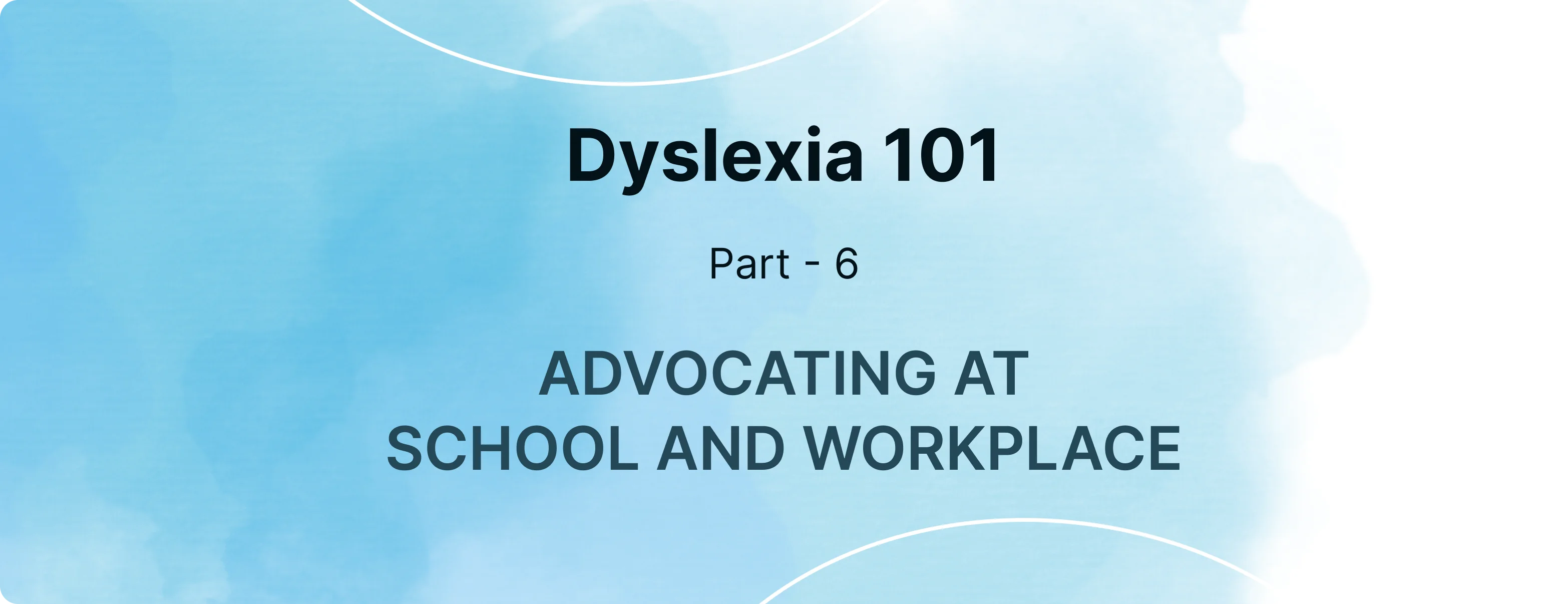Dyslexia Advocacy Tips: How to Speak Up at School or the Workplace

Stephanie Tsapakis
|
Published on Aug 18, 2021 · 6 min read


Stephanie Tsapakis
|
Published on Aug 18, 2021 · 6 min read

Welcome to Part VI, the final post of our Dyslexia 101 series! The goal of this blog series was focused on expanding your understanding of dyslexia.
After this final post in LD Expert's Dyslexia 101 series you will have become able to:
Today we will focus on advocacy, and what you can do and say to stand up for your child or yourself.
In Part I of this blog series, we broke down the definition of dyslexia for you. In Part II, we examined the characteristics of dyslexia by outlining common struggles and strengths. Part III focused on implications of dyslexia in the classroom and workplace.Part IV debunked some common misconceptions surrounding dyslexia. Part V explained how to choose an appropriate intervention program.
For the finale of our Dyslexia 101 Blog Series, you will learn:

For the purposes of this blog, we love defining advocacy as any action that speaks in favor of, recommends, argues for a cause, supports or defends, or pleads on behalf of others.
For our students with dyslexia and learning differences, advocacy is when we defend and explain the need for support, accommodations, modifications, and/or intervention at school so that our students can achieve and excel at the same rate as their peers. Advocacy most often occurs within the context of a school meeting but it can – and should – also occur for teens or adults in the workplace.
Successfully advocating for a student or adult typically involves three things:
A deep knowledge & understanding of the person receiving the advocacy
A comprehensive & professional level of knowledge related to the diagnosis/difficulty
A functional & working understanding of the special education process and the rights of individuals with disabilities in both school and the workplace

In a school-based setting, a parent is nearly always the person best equipped to advocate for a student using their deep understanding of who their child is as a person. This involves painting a clear picture of the student and can include information about:
As a side note, teaching self-advocacy skills to students is always a good idea. When the student is old enough, he/she becomes the one best equipped to speak to his/her strengths, struggles, and the impact their learning difference has on their academic experience. They also are able to share important information related to their own school- and career-based goals.
As mentioned above good advocacy involves knowledge of the student, the diagnosis/difficulty, and the special education process.
Parents have long-demonstrated the ability to make themselves experts on their child's diagnosis and the special education process. A mama bear equipped with knowledge of her child's options and rights is nearly always unstoppable.
That being said, it can be very challenging as a parent to successfully explain, defend, and advocate for a student's educational needs related to their specific learning difficulty or diagnosis. This becomes increasingly complicated when you add in the complexities, lingo, and timelines related to the special education process.
A great solution, and one that we always highly recommend, is to hire a special education advocate to walk with you through the process and to join you at the school meetings.
A special education advocate uses their knowledge of learning differences, the special education process, and student's rights that are protected under the Individuals with Disabilities Education Act (IDEA) to help ensure that students receive the accommodations, modifications, intervention services, and access to the free and appropriate public education that they are entitled to based upon classroom data, team input, and standardized testing.
School-based special education advocates help students and parents:
When a parent has a skilled and compassionate special education advocate as part of their student's team, navigating the waters becomes more manageable and less overwhelming.
Advocates can both attend meetings with you and meet with you on a consultation basis. During consultations, advocates can help you understand what to expect, understand your student's rights, and/or review your student's special education history in order to make appropriate recommendations individualized to meet your student's needs.

As a teen or adult in the workplace, your rights as a person with dyslexia or other disability* are protected through the Americans with Disabilities Act (ADA). Therefore, you have every right to advocate for yourself or partner with an advocate so that you receive appropriate workplace accommodations.
This is most easily done when you have been appropriately diagnosed, but many adults have never received a medical or clinical diagnosis. Therefore, we will look at advocacy recommendations for both groups:
Adults that have been medically or clinically diagnosed
Adults that have been medically or clinically diagnosed
If you are an adult that has been diagnosed with dyslexia or other learning difference, it is important to convey this information while advocating for yourself:
If you are an adult that has not received a diagnosis, most of the information you'll want to share remains the same with a few minor changes:
*At LD Expert we don't love the term learning disability and prefer learning differences. Unfortunately within the workplace setting, using the term "learning disability" can help your employer take the conversation and your concerns more seriously.
Having this conversation with an employer or manager can be very overwhelming, and understandably so! The good news is that advocates also exist to help you navigate and prepare for the conversation. They're even available to attend these meetings with you.
Here are a few things to remember:
We cannot overstate how much we love Drs. Shaywitz book, Overcoming Dyslexia. It is the Gold Standard when it comes to books to help you understand and navigate life with dyslexia that is based on years of research. Here's the link again to purchase!
Looking for personalized support for your child's learning journey?
Our tutoring and dyslexia intervention services are tailored to students with learning differences. Whether it's reading, writing, or other challenges, our team offers one-on-one guidance.
Start with a consultation!Stay updated with our latest blog posts.
Cart